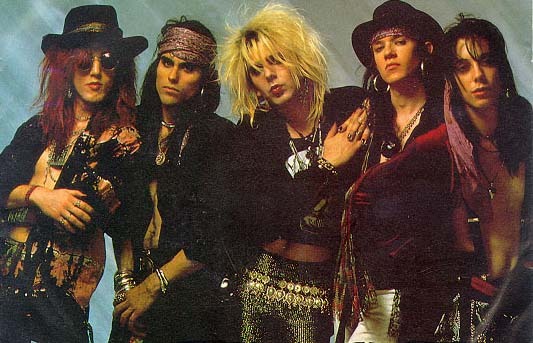
Of all the sleazy bands in the late 80s glam rock boom, Faster Pussycat was the sleaziest.
With their greasy, funk-tinged hair metal returning again and again to themes such as murder (“Wake Me When It’s Over,” “The Body Thief”), child abuse (“House of Pain,” “Pulling Weeds,” “Only Way Out”), disconnection (“Ain’t No Way Around It,“ “Nonstop to Nowhere,“ “Maid in Wonderland”) and sexual excess (“The Bathroom Wall,”“Where There‘s A Whip, There‘s A Way,” “ Madam Ruby‘s Love Boutique,“ “Little Dove“), Faster Pussycat was the glam metal love child of Aerosmith and Andrew Vachss. Lead singer Taime Downe’s voice sounded like a rat squeezing through an electrical pipe to chew on wires, scurrying and scratching behind the peeling flophouse walls of Brent Muscat and Eric Steel‘s guitars.
Musically and visually they might have been squarely in the glam metal tradition, but attitude-wise, they were closer to White Zombie’s La Sexorcisto: Devil Music Vol.1, a growling muscle-car of an album, all grimy pistons and ugly, black smoke, an album which also features a number of samples from the same Russ Meyer movie from which Faster Pussycat took its name.
Lots of bands pretended to be sleazy. The sex anthem was ubiquitous in 80s metal. Bands made it a selling point. But most of it was a polished misogyny, sexism commercialized to the point where it was never truly threatening, at least not to the women that were fans of that kind of music. Poison might want women to talk dirty, but they didn’t want their women to FEEL dirty.
Faster Pussycat always felt dirty to me. Poison’s “Fallen Angel” was shiny and upbeat enough to make being a runaway sound romantic. Winger’s “Seventeen” made sex with an underage girl sound like not such a bad thing…and kind of empowering for the girl as well. Faster Pussycat’s “Little Dove”…not so much. There was an edge to Faster Pussycat, a darkness.
An honesty?
Maybe that’s why they never broke through. Their closest thing to a hit was the ballad “House of Pain,” followed by “Poison Ivy,” which, while a good song, was a lot closer to the sort of harmless sexism that the grittiness of much of their other material.
Faster Pussycat was more LA Noire than LA Guns. An while it might have hurt them at the time, it makes them distinct enough that they hold up today a lot better than most of their contemporaries who seemed content to all try and sound the same without trying to sound like they were all trying to sound the same.
No comments:
Post a Comment